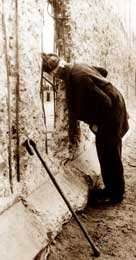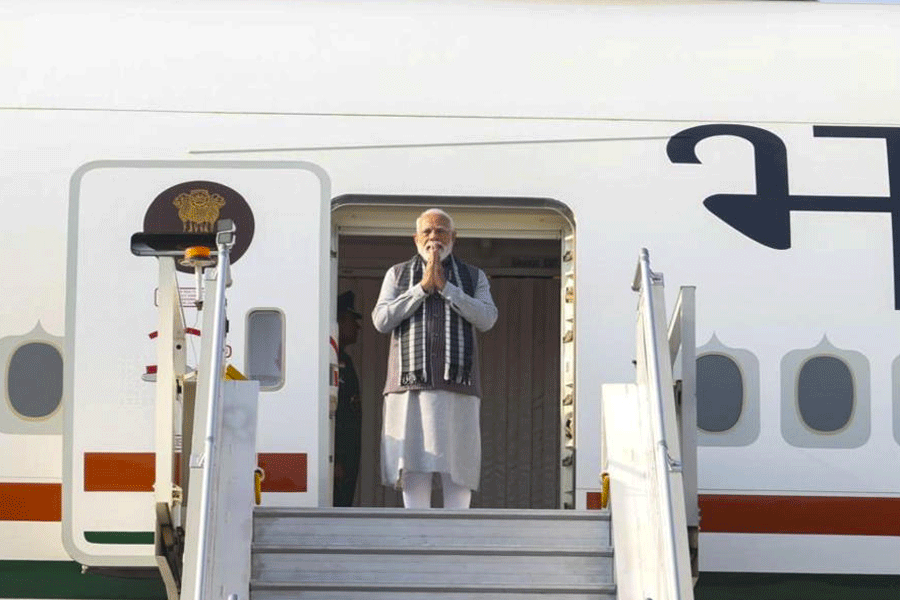|
|
Birthdays are important to Indians. They form the basis of drawing up the horoscope of an individual. But the importance of the birthday does not end there. If, thanks to the blessings of the horoscope, the individual becomes famous, then the birthday becomes an occasion for celebration. Given the proneness to exaggeration among Indians, such celebrations can often be a trifle over the top.
Take the example of the advertisement that was splashed in yesterday?s newspaper. The advertisement, issued by the ministry of human resource development, commemorates the birthday of Indira Gandhi. It describes her as ?the most illustrious single girl child in our history??. Pause a moment to think of the claim that is being made before the entire country and to its history by a responsible ministry. One single individual has been selected as the most illustrious and distinguished single girl child from a span of more than 2,000 years of history.
Indira Gandhi, by any reckoning, was a redoubtable woman who had an extraordinary childhood. She was the only daughter of a very distinguished father and a remarkable mother. Her father, Jawaharlal, was often away for political work and, what was worse, he was also frequently imprisoned by the British for very long periods. Her mother, Kamala, was not always very well, and her ill health may not have been unrelated to the fact of her being a complete misfit in the Nehru family in Allahabad. The Nehrus, as a result of a conscious decision on the part of the patriarch, Motilal, were very anglicized in their social mores. Motilal?s children all had English nicknames, Jo, Nan and so on. He sent Jawaharlal to Harrow to become a wog. But when it came to choosing a wife for his son, he chose a middle class Kashmiri girl, whose father owned a flour mill. Kamala spoke only Hindi and Urdu and, before her marriage, had to be brought to Allahabad and given lessons in deportment. She never did bridge the social barrier that existed between her and the Nehru family. Her sisters-in-law often ridiculed her lack of social graces. It is said that Indira carried memories of the slights her mother had to endure.
Indira?s childhood was lonely in the family mansion, Anand Bhavan. Given the circumstances, she was probably not happy enough to enjoy the innocence of childhood. The affluence of the family was obvious but it was overshadowed by the demands of nationalism, which claimed her father, grandfather and even her mother. There were compensations. She came to know Mahatma Gandhi very closely and received his affection. She was also the recipient of the most unique set of letters that any child has had the good fortune to receive from a father. Acutely conscious that he was neglecting his daughter, her education and her upbringing, Jawaharlal decided in 1928, when she was in Mussoorie and he in the plains, to write to her a series of letters to introduce her to history. The letters covered the origins of the earth, the beginnings of life and prehistory and moved on to the formation of classes, the coming of the Aryans and the development of organized religion. He had to discontinue the series as the stress of politics made impossible the writing of letters to a growing daughter. The letters were sensitive and informed. They remain, as Letters from a Father to his Daughter, one of the finest introductions to history.
Indira?s childhood in its loneliness, in its enforced separation from a dynamic and sensitive father, in its exposure to the tensions operating within the household and in the short-lived attempt made by her father to educate her, was definitely one that was out of the ordinary. But there were other girls in many other parts of India who, on a different register and scale, had had similar experiences: the loneliness of a single daughter, the aloofness of a father, and the humiliation suffered by a mother in the hands of in-laws. The affluence of the Nehrus, the political atmosphere of Anand Bhavan, the closeness to Gandhi and above all the letters she received from her father made Indira?s childhood distinct.
Yet there is nothing in Indira?s childhood that quite merits the adjectives illustrious and distinguished. She was by no means outstanding in anything in her school. In fact, if her subsequent record in Oxford and in Santiniketan is any indication, she was indifferent to the rewards of formal education. Both places ? Oxford because of its scholarly ambience, and Santiniketan because of the presence of Rabindranath Tagore and other distinguished faculty members ? offered opportunities for pursuing academic excellence. But Indira rejected them. It is not known if this rejection grew out of a deliberate choice (sounds unlikely) or from a psychological inability to respond to the discipline that the serious pursuit of academics demands. There is also no evidence that Indira, as a child, was gifted in terms of creativity or any other talent. In fact, she comes across as an introverted and shy child. There were no signs of the charisma that came to be associated with her later on in life. The single girl child Indira was singularly undistinguished and even anonymous.
So what is it that makes the human resource ministry heap superlatives on the single girl child, Indira? It is a retrospective act. The achievements of Indira?s adult life are made to shine on her childhood. It is thus also an act of myth-making.
What was there in Indira?s adult life that makes her the most distinguished in India?s long history? The achievements obviously relate to her prime ministership. She came to be prime minister somewhat before she expected because of the sudden death of Lal Bahadur Shastri. But she came to wear the crown of power as if it were her birthright. Over her tenure as prime minister fell the shadow of the Emergency, the only threat to democracy that the Indian republic has had to suffer. The Emergency was nothing more than an attempt on her part to perpetuate her own and her family?s power. An attempt to destroy ? or if that is too strong a word, then undermine ? democracy does not really merit any kind of superlative.
But let us keep the Emergency to one side. There were other things that Indira Gandhi did as prime minister that actually do not merit any recommendation, since they are all against the principles of Indian democracy. To take a few examples: the centralization of power in the prime minister?s office carried out by her principal adviser, P.N. Haksar; the promotion of an active judiciary; the appropriation of intellectuals through an elaborate system of patronage and nepotism; the nexus between politics and business; the covert encouragement given to corruption in public life; the complete erosion of scruples and integrity among the political class; and the use of religion to gain political leverage. All of these have become part of India?s polity and all of them date back to the Indira Gandhi era in Indian politics.
This is not a record that can engender encomiums of the kind the human resource ministry has put on print. Indeed, the advertisement points to another contribution of Indira Gandhi to India?s politics ? chamcha culture.
Oscar Wilde once famously said that no man becomes like his mother, that is their tragedy; all women become like their mothers, that is their tragedy. Taking a cue from that, one is tempted to say that Indira did not become like her mother, that is India?s tragedy. Heaven forbid that Indira Gandhi should become a role model for children in India. At the same time, let us hope that no single girl child should have as lonely a childhood as Indira Priyadarshinee.












